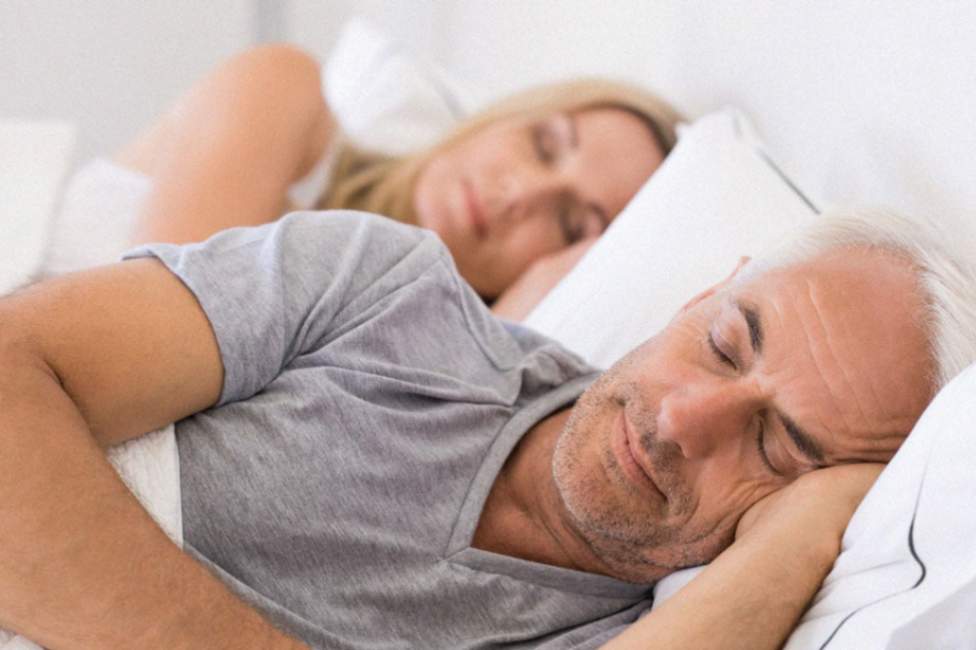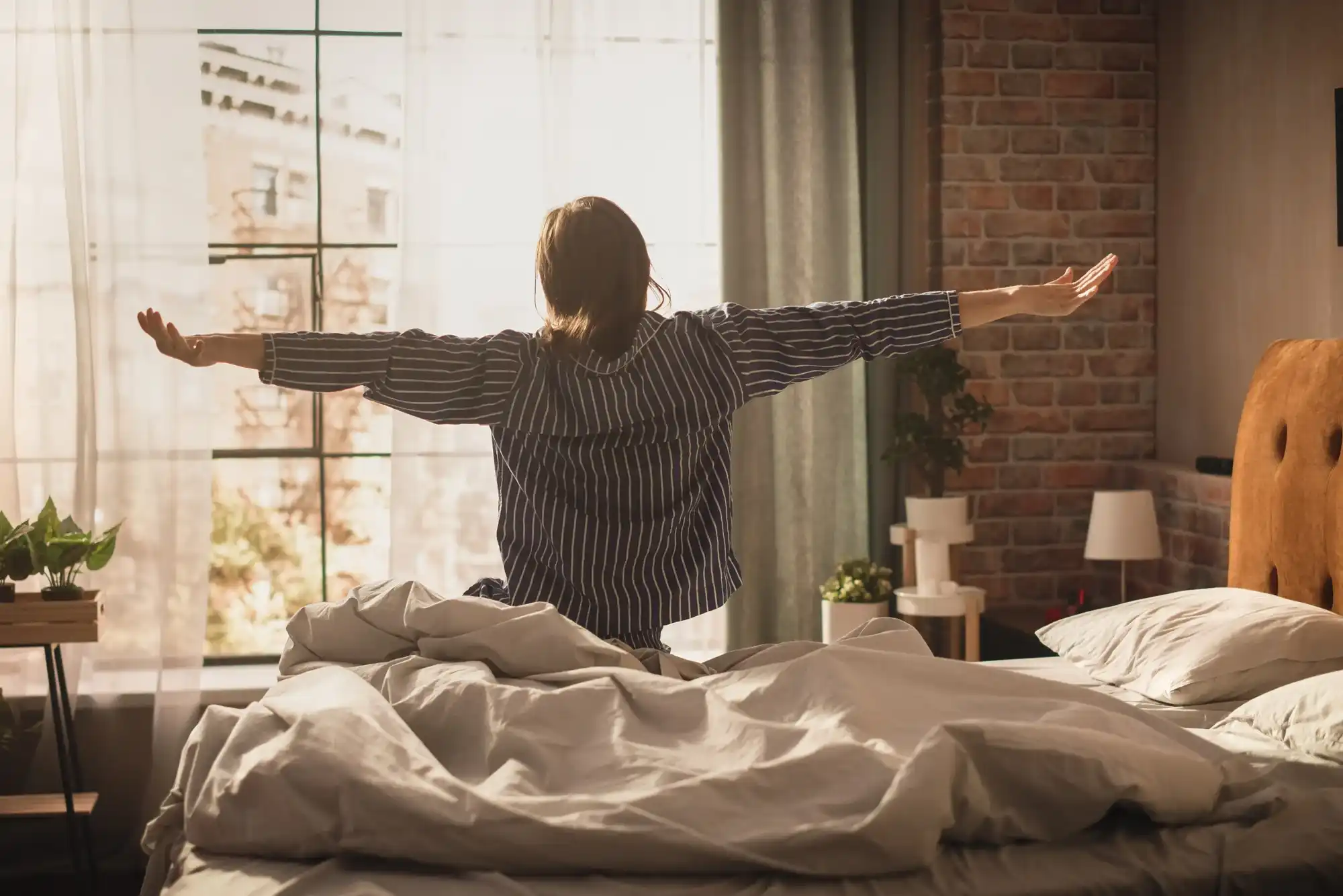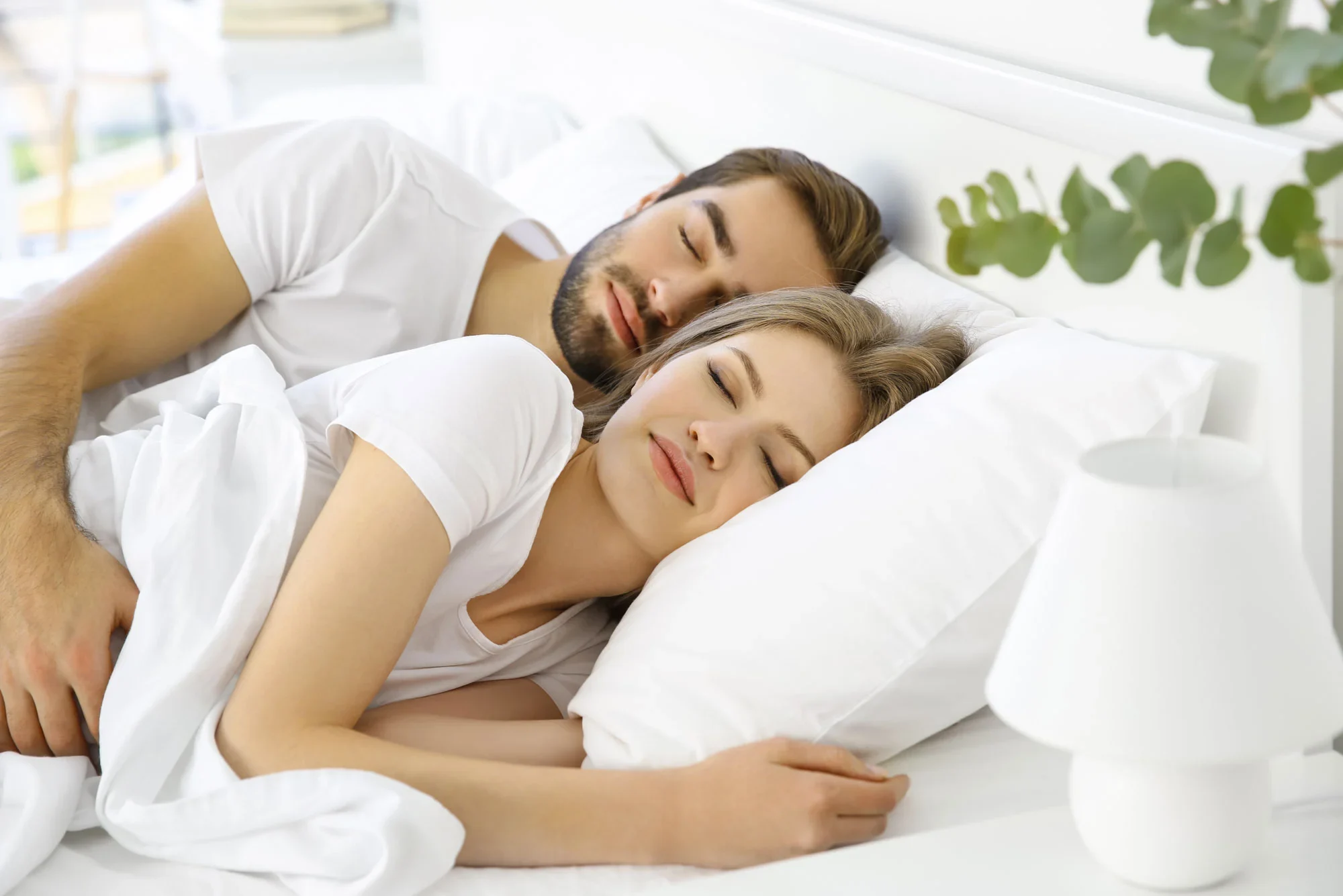It’s the middle of the night and you’re either tossing and turning or completely wide awake for no good reason. The time ticks closer and closer to that tragic moment when your alarm blares and the sun comes up to remind you that you failed to get a good night’s sleep… again. How did this happen? After a hard day’s work, you were legitimately exhausted when bedtime rolled around—so exhausted in fact that you began to doze off on the couch around 10 p.m. Yet here you are in bed, staring at the ceiling for hours on end.
Article at a Glance:
The Science of Sleep
- As you sleep, your brain performs necessary maintenance and information consolidation
- A healthy sleep cycle is comprised of five phases
- A proper night’s sleep can help you feel alert, well-rested, and on your game
What If You Don’t Get Enough Sleep?
- Poor sleep habits have short-term and long-term effects
- Not getting enough sleep can even negatively impact your heart and brain health
Ingredients for a Good Night’s Sleep
- Melatonin
- Magnesium
- Ashwagandha
- Valerian Root
- Hops
- Vitamin B12
Tips for a Good Night’s Sleep
- Protect against blue light
- Ease up on caffeine well before bedtime
- Find healthy ways to deal with stress
- Get plenty of natural bright light
This scenario has played itself out countless times in all of our lives. Sleep deprivation—no matter how frequent—can seriously compromise your ability to function at work or at home, and can have just as much of a negative impact on your health as poor diet or lack of exercise.
What Is Sleep & Why Do You Need It?
Most of us think of sleep as merely a period of time when the body completely shuts down for a handful of hours. But it’s far more complicated than a physiological light switch flipping on and off. You’re actually quite active while you sleep—particularly your brain, which processes information it gleaned during your waking hours, restores its components, and strengthens itself in preparation for the following day.
While science doesn’t necessarily know how we evolved to require long periods of sleep for healthy cognitive and motor function, we recognize the need for sleep and understand that after a good night’s sleep, we feel rested and more alert. A good night’s sleep is just as essential as any essential vitamin.
However, a healthy night’s sleep isn’t one long trek, but rather more like a series of pit stops. You usually pass through five phases during your typical sleep cycle. This includes stages 1, 2, 3, 4, and REM (rapid eye movement) sleep. During the night, you’ll likely cycle through these stages multiple times, always starting at 1 and ending on REM, before repeating the cycle with stage 1.
What Happens When You Don’t Get Enough Sleep?
Mainly manifesting as fatigue and irritability the next day, the occasional night of sleeplessness isn’t enough to negatively affect your health in the long term. However, if your lack of sleep continues on a nightly basis, it can be a detriment to your overall health, eventually rendering you prone to less-than-ideal medical conditions.
Missing out on precious hours of sleep can have both short-term and long-term effects on not only your health, but also your ability to perform simple tasks throughout the day. For starters, there’s the lack of alertness you’re sure to display. According to research, even missing as little as 1.5 hours of sleep can have an impact on your ability to stay alert. Other short-term effects of sleeplessness include impaired memory, relationship stress, a decrease in your quality of life, and a greater likelihood for car accidents due to drowsiness.
As your sleeplessness becomes chronic, the health problems become more serious and long term. Chronic sleep deprivation has demonstrated negative effects on heart health, along with changes in mood and cognitive performance.
Ingredients & Practical Tips For A Healthy Night’s Sleep
There’s plenty of practical approaches to ensure you get a better night’s sleep and those universal truths of slumber are all tied to a collection of vitamins, minerals, hormones, and herbs that could potentially aid you in your search for a decent night’s rest.
Melatonin
A hormone that regulates the sleep-wake cycle, melatonin is primarily released by your pineal gland, which is located deep in the center of your brain. Once called the “third eye,” the pineal gland plays a pivotal role in your circadian rhythm—your body’s internal clock. Studies show that melatonin may help your body recover from certain internal-clock disruptions like jet lag, a shift in working hours, and insomnia.
Your pineal gland is supposed to secrete melatonin throughout your sleep cycle, however, several factors can throw a wrench into that chemical process. One of those factors is blue light, which is emitted from electronic devices like smartphones and computers in large amounts. Overexposure to blue light can actually trick your brain into thinking it’s still daytime, thereby blocking you from getting true deep sleep.
![]() Practical Tip: Fight back against blue light exposure. Try to avoid using your smartphone or computer two hours before hitting the sack. You can also find a pair of glasses that block blue light or install blue light-blocking apps on your smartphone or desktop. Also, you can look into eye health supplements with Lutein, which has been shown to help with blue light exposure.
Practical Tip: Fight back against blue light exposure. Try to avoid using your smartphone or computer two hours before hitting the sack. You can also find a pair of glasses that block blue light or install blue light-blocking apps on your smartphone or desktop. Also, you can look into eye health supplements with Lutein, which has been shown to help with blue light exposure.
Magnesium
This dynamic mineral is responsible for more than 300 reactions within your body including protein synthesis, blood pressure regulation, nerve function, and more. Studies show it can also improve relaxation and enhance the quality of your sleep.
There is also some evidence that magnesium can help older adults fall asleep faster, while also helping those with restless legs syndrome enjoy more quality shut eye. Meanwhile, other research shows that magnesium could increase the neurotransmitter called GABA, which can relax your thinking and help you fall asleep.
![]() Practical Tip: Avoid caffeine late in the day. While sensible doses of caffeine can enhance focus and energy, consuming caffeine beverages up to six hours before bed could negatively alter your sleep. What’s more, there’s some evidence that caffeine could deplete your body’s supply of magnesium. So perhaps its best to say no to that late afternoon cup of joe!
Practical Tip: Avoid caffeine late in the day. While sensible doses of caffeine can enhance focus and energy, consuming caffeine beverages up to six hours before bed could negatively alter your sleep. What’s more, there’s some evidence that caffeine could deplete your body’s supply of magnesium. So perhaps its best to say no to that late afternoon cup of joe!
Ashwagandha, Valerian Root & Hops
First, ashwagandha boasts robust anti-stress properties as an adaptogen that’s been shown to reduce stress-related impairments, including cortisol levels. In relation to sleep, studies show that ashwagandha proves to be a potent sleep-inducing herb.
Valerian root has been referred to as “nature’s valium” and hops, a common component in beer, has natural sedative effects. In a joint effort, the two flower-related botanicals can have a profound effect on how well you sleep.
Valerian root contains compounds that could reduce anxiety and therefore could promote a better night’s sleep. Meanwhile, a study showed that dried valerian root helped participants display decreased symptoms of insomnia.
As for hops, the ingredient that gives some beers its floral notes could also have a sedative effect on your body’s nervous system—and this could have a direct effect on the circadian rhythm. And when combined, hops and valerian root make each other even more effective for promoting sleep.
![]() Practical Tip: Take steps to reduce anxiety. According to the Anxiety and Depression Association of America, stress and anxiety could exacerbate any sleep problems you’re already fighting. There are steps you can take just before bed to relieve any lingering stress: meditation can help reduce anxiety, as can deep breathing exercises, and grounding techniques.
Practical Tip: Take steps to reduce anxiety. According to the Anxiety and Depression Association of America, stress and anxiety could exacerbate any sleep problems you’re already fighting. There are steps you can take just before bed to relieve any lingering stress: meditation can help reduce anxiety, as can deep breathing exercises, and grounding techniques.
Vitamin B12
And finally, while vitamin B12 is mostly associated with energy, evidence shows that it could also help you maintain a proper circadian rhythm. It seems that taking the vitamin early in the day could help to regulate your sleep-wake cycles by promoting a more consistent voyage through the four-stage sleep cycle.
And since depression could disrupt your circadian rhythm, vitamin B’s efficacy in lowering depression could also contribute to a healthier sleep schedule.
![]() Practical Tip: Get plenty of sunlight during the day. Your circadian rhythm is your body’s natural time-keeping component. When you’re deprived of natural bright light, that rhythm can be thrown off. In individuals with unhealthy sleep patterns, daytime bright light exposure demonstrated an improvement of overall sleep quality and duration. So, make sure you get outside for a sun-soaked walk!
Practical Tip: Get plenty of sunlight during the day. Your circadian rhythm is your body’s natural time-keeping component. When you’re deprived of natural bright light, that rhythm can be thrown off. In individuals with unhealthy sleep patterns, daytime bright light exposure demonstrated an improvement of overall sleep quality and duration. So, make sure you get outside for a sun-soaked walk!









